818
History is written by winners
Reinhard Gehlen - first, in the center - with cadets razvedshkoly
History is written by the winners, and therefore have not accepted the Soviet chroniclers mention German spies who worked in the rear of the Red Army. And these were the scouts, with even the General Staff of the Red Army, as well as the famous network "Max." After the war, the Americans they transferred to themselves, to share their experience with the CIA.
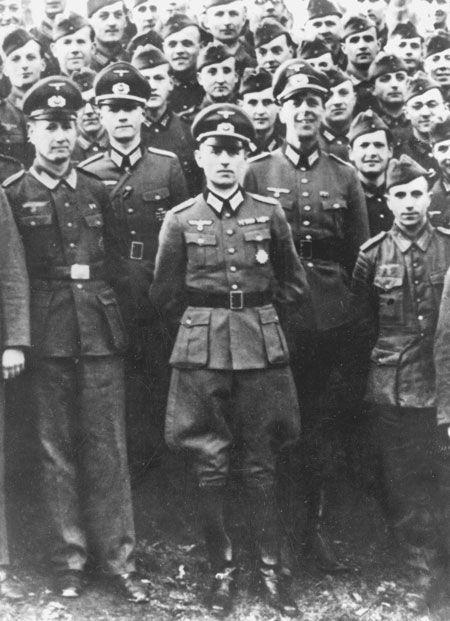
Indeed, it is easy to believe that the Soviet Union managed to create a network of agents in Germany and the occupied countries (the most famous - "The Red Chapel"), and the Germans - no. And if a German spy during WWII do not write in the Soviet-Russian history, it is not only that the winner is not decided to confess to his own miscalculations. In the case of German spies in the Soviet Union the situation is complicated by the fact the head of the department "Foreign armies - East" (the German acronym FHO, it was he who was in charge of intelligence) Reinhard Galen prudently took care to preserve the most important documents, to the very end of the war to surrender to the Americans and offer them a "good person».
His department was engaged almost exclusively the USSR and in a starting "cold war" gelenovskie paper presented to the United States a great value.
Later, the general led the exploration of Germany, and its archive was in the United States (some copies left Gehlen). Even in retirement, General published a memoir "service. 1942-1971 ", released in Germany and the United States in 1971-72. Almost simultaneously with the book Gehlen in America published his biography and a book by the British intelligence Edward Spiro "Gehlen - spy of the century" (Spiro wrote under the pseudonym Edward Kukridzh, he was a Greek, a representative of British intelligence in the Czech resistance during the war). Another book was written by an American journalist Charles Whiting, who was suspected of working for the CIA, and was called "Gehlen - German master spy." All these books are based on the archives of Helena, used with the permission of the CIA and German intelligence service BND. Some information about German spies in the Soviet rear they have.
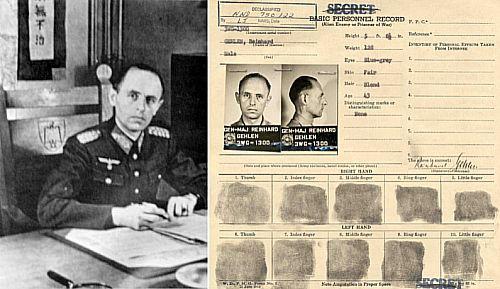
(Personal Card Helena)
"Field work" in German intelligence Ernst General Gehlen worked Kestring, Russian German, born near Tula. It was he who served as the prototype of the German major in Bulgakov's book "Days of Turbin," Hetman Skoropadsky saved from massacre by the Red Army (in fact - Petlurites). Kestring perfectly knew the Russian language and Russian, and that he personally selected the agents and spies of the Soviet prisoners of war. It was he who found one of the most valuable, as it turned out, the German spies.
October 13, 1941 was captured by 38-year-old captain Minishky. It turned out that before the war he worked in the Secretariat of the Central Committee of the CPSU (b), and earlier - in the Moscow City Party Committee. Since the beginning of the war he served as political officer at the Western Front. He was captured along with the driver when the rounds leading part in the battle of Vyazma.
Minishky immediately agreed to cooperate with the Germans, claiming some old grudge against the Soviet regime. Seeing what a valuable picture got them, they promised, as the time will come and take him and his family to the west with the provision of German citizenship. But first - business.
Minishky spent 8 months, studying in a special camp. And then began the famous "Operation Flamingo", which Geleen conducted in collaboration with the scout Bown, who already had a network of agents in Moscow, among which the most valuable was a radio operator with the pseudonym Alexander. People Bown Minishkiya transported across the front line, and it is reported to the headquarters of the first Soviet story of his captivity and the daring escape, every detail of which was invented gelenovskimi experts. He was taken to Moscow, where he was greeted as a hero. Almost immediately, mindful of his former demanding job, he was assigned to work in the military and political secretariat of T-bills.
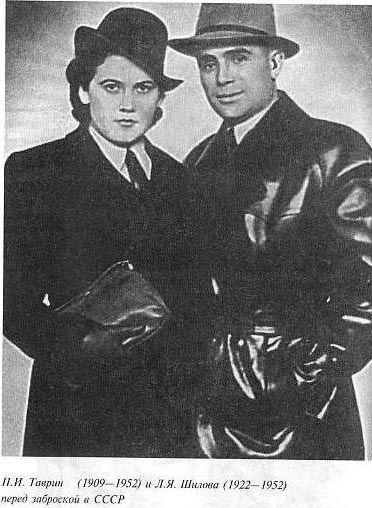
(The real German agents, might look something like this and other German spies)
According to the chain through several German agents in Moscow Minishky began supplying information. The first eye opener came from a July 14, 1942. Gehlen and Herre sat all night, making it the basis of a report to Chief of Staff Halder. The report was made: "War ended with a meeting in Moscow on the evening of July 13. Present Shaposhnikov, Voroshilov, Molotov and head of the British, American and Chinese voennnyh missions. Shaposhnikov said that their departure will be up to the Volga, to force the Germans to spend the winter in the area. During the retreat should be made comprehensive destruction do not leave the territory; the whole industry should be evacuated to the Urals and Siberia.
The British representative asked for Soviet help in Egypt, but was told that the Soviet resources mobilized manpower is not as great as believed allies. In addition, they do not have planes, tanks and guns, in particular, because of the supplies destined for Russian weapons, which the British had to deliver through the port of Basra in the Persian Gulf, it has been reoriented to protect Egypt. It was decided to conduct offensive operations in the two sectors of the front: the north and north of Eagle Voronezh, using large armored forces and air cover. Distracting attack should be carried out at the Kalinin. It is necessary to Stalingrad, Novorossiisk and Kavkaz were kept ».
Everything just happened. Later, Halder noted in his diary: "FHO has provided accurate information about enemy forces, re-deployed, starting from June 28, and the alleged power of these compounds. He also gave a correct estimate of the enemy's vigorous action for the protection of Stalingrad ».
The above-mentioned authors made a number of inaccuracies, which is understandable: the information they receive in a few hands, and 30 years after the events described. For example, the British historian David Ken gave a correct version of the reports: July 14, at the meeting were not the head of the American, British and Chinese missions and military attaches of the countries.
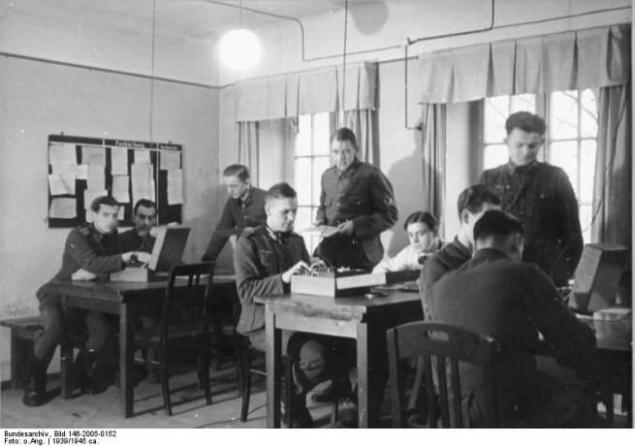
(Secret razvedshkolu OKW Amt Ausland / Abwehr)
There is no consensus about the real name Minishkiya. According to another version, his name was Mishinsky. But perhaps it is not true. The Germans, he was held under the code digits 438.
On the fate of agent 438 Kulridzh and other authors have reported sparingly. Participants of the operation "Flamingo" exactly worked in Moscow until October 1942. In the same month Gehlen Minishkiya withdrew, having arranged with the help of Bown meeting with one of the most advanced intelligence units "Valley", which forwarded it to the front line.
Later Minishkiya worked with Helena in the department of analysis of the information dealt with German agents, which are then thrown over the front line.
Minishkiya operation and "Flamingo" is also called, and other respected authors such as the British military historian John Eriksson, in his book "The Road to Stalingrad, the French historian Gabor Rittershporn. According Rittershporna, Minishky really got German citizenship after the Second World War snasala taught in American intelligence school in southern Germany, and then moved to the United States, became an American citizen. Died German "Stirlitz" in 1980 at his home in Virginia.
Minishkiya was not the only superspy. Those British military historians mention that the Germans had a lot intercepted telegrams from Kuibyshev, where at that time were based Soviet authorities. This city has a German spy ring. There were a few "moles", surrounded by Rokossovsky, and some military historians have mentioned that it is the Germans regarded as one of the main negotiators with possible separate peace at the end of 1942, and then in 1944 - if the attempt on Hitler would be successful. For unknown reasons, today, Rokossovsky considered as a possible ruler of the Soviet Union after Stalin's overthrow in a coup generals.
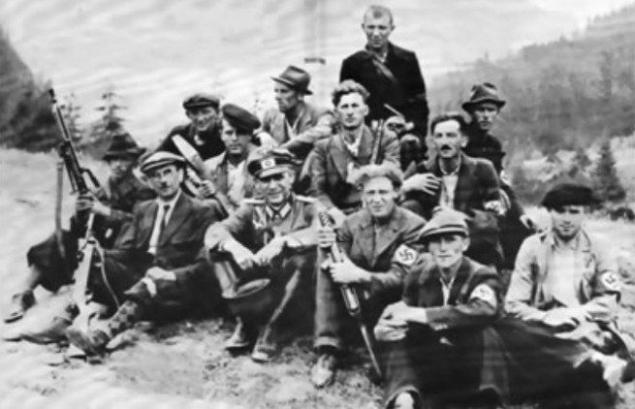
(Such was the division of German saboteurs "Brandenburg". One of the most famous of its operations - the capture of Maikop oil fields in the summer of 1942, the city itself)
The British were well aware of these German spies (of course, they know now). This is recognized and Soviet military historians. For example, a former colonel in military intelligence, Yuri Modin, in his book "The Fate of the scouts: my Cambridge friends' claims that the British were afraid to supply the Soviet Union information obtained through the decoding of the German reports, because of the fear that the Soviet headquarters have agents.
But personally mention another German superrazvedchika - Fritz Kauders, who created the famous Soviet intelligence network "Max." His biography presents the aforementioned Englishman David Kahn.
Kauders Fritz was born in Vienna in 1903. His mother was Jewish and his father - a German. In 1927, he moved to Zurich, where he worked as a sports journalist. Then he lived in Paris and Berlin, after Hitler came to power, a reporter went to Budapest. There he found a profitable occupation - an intermediary in the sale of the Hungarian entry visas to Jews fleeing from Germany. He struck up acquaintances with senior Hungarian officials, and at the same time he met with the head of the Abwehr residency in Hungary and went to work for German intelligence. He brings familiarity with the general Russian emigre A.V.Turkulom who had their own network of agents in the Soviet Union - she later served as the basis for a more extensive German spy network. Agents are thrown into the Union for a year and a half, since the fall of 1939. Greatly helped here Romanian accession of Bessarabia to the Soviet Union, at a time when the "attached" to advance and abandoned dozens of German spies.
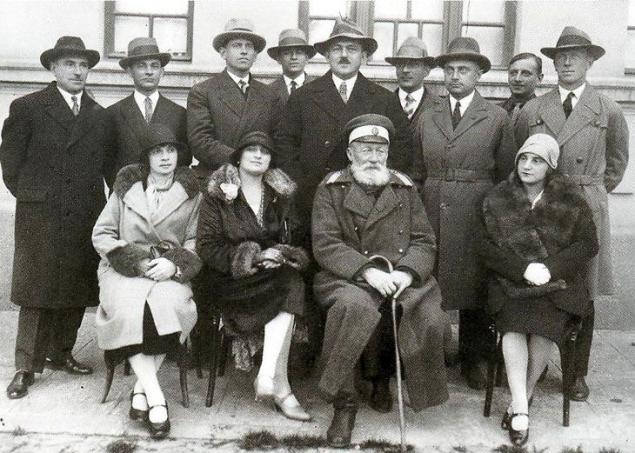
(General Turkul - in the center, with a mustache - with colleagues-Whites in Sofia)
The outbreak of war with the Soviet Union, Kauders moved to the Bulgarian capital Sofia, where he headed radiopost Abwehr, who received radio messages from agents in the Soviet Union. But who were these agents - are not clarified yet. There are only pieces of information that they had at least 20-30 at various points in the USSR. On the intelligence network, "Max" in his memoirs mentions the Soviet superdiversanta Sudoplatov.
As mentioned above, not only the names of German spies, and minimal information about their activities in the Soviet Union is still closed. Does the Americans and the British information about them after the Soviet victory over fascism? Unlikely - the surviving agents were needed by him. The maximum that was then declassified - secondary agents of the Russian emigre organization NTS.
History is written by the winners, and therefore have not accepted the Soviet chroniclers mention German spies who worked in the rear of the Red Army. And these were the scouts, with even the General Staff of the Red Army, as well as the famous network "Max." After the war, the Americans they transferred to themselves, to share their experience with the CIA.

Indeed, it is easy to believe that the Soviet Union managed to create a network of agents in Germany and the occupied countries (the most famous - "The Red Chapel"), and the Germans - no. And if a German spy during WWII do not write in the Soviet-Russian history, it is not only that the winner is not decided to confess to his own miscalculations. In the case of German spies in the Soviet Union the situation is complicated by the fact the head of the department "Foreign armies - East" (the German acronym FHO, it was he who was in charge of intelligence) Reinhard Galen prudently took care to preserve the most important documents, to the very end of the war to surrender to the Americans and offer them a "good person».
His department was engaged almost exclusively the USSR and in a starting "cold war" gelenovskie paper presented to the United States a great value.
Later, the general led the exploration of Germany, and its archive was in the United States (some copies left Gehlen). Even in retirement, General published a memoir "service. 1942-1971 ", released in Germany and the United States in 1971-72. Almost simultaneously with the book Gehlen in America published his biography and a book by the British intelligence Edward Spiro "Gehlen - spy of the century" (Spiro wrote under the pseudonym Edward Kukridzh, he was a Greek, a representative of British intelligence in the Czech resistance during the war). Another book was written by an American journalist Charles Whiting, who was suspected of working for the CIA, and was called "Gehlen - German master spy." All these books are based on the archives of Helena, used with the permission of the CIA and German intelligence service BND. Some information about German spies in the Soviet rear they have.

(Personal Card Helena)
"Field work" in German intelligence Ernst General Gehlen worked Kestring, Russian German, born near Tula. It was he who served as the prototype of the German major in Bulgakov's book "Days of Turbin," Hetman Skoropadsky saved from massacre by the Red Army (in fact - Petlurites). Kestring perfectly knew the Russian language and Russian, and that he personally selected the agents and spies of the Soviet prisoners of war. It was he who found one of the most valuable, as it turned out, the German spies.
October 13, 1941 was captured by 38-year-old captain Minishky. It turned out that before the war he worked in the Secretariat of the Central Committee of the CPSU (b), and earlier - in the Moscow City Party Committee. Since the beginning of the war he served as political officer at the Western Front. He was captured along with the driver when the rounds leading part in the battle of Vyazma.
Minishky immediately agreed to cooperate with the Germans, claiming some old grudge against the Soviet regime. Seeing what a valuable picture got them, they promised, as the time will come and take him and his family to the west with the provision of German citizenship. But first - business.
Minishky spent 8 months, studying in a special camp. And then began the famous "Operation Flamingo", which Geleen conducted in collaboration with the scout Bown, who already had a network of agents in Moscow, among which the most valuable was a radio operator with the pseudonym Alexander. People Bown Minishkiya transported across the front line, and it is reported to the headquarters of the first Soviet story of his captivity and the daring escape, every detail of which was invented gelenovskimi experts. He was taken to Moscow, where he was greeted as a hero. Almost immediately, mindful of his former demanding job, he was assigned to work in the military and political secretariat of T-bills.

(The real German agents, might look something like this and other German spies)
According to the chain through several German agents in Moscow Minishky began supplying information. The first eye opener came from a July 14, 1942. Gehlen and Herre sat all night, making it the basis of a report to Chief of Staff Halder. The report was made: "War ended with a meeting in Moscow on the evening of July 13. Present Shaposhnikov, Voroshilov, Molotov and head of the British, American and Chinese voennnyh missions. Shaposhnikov said that their departure will be up to the Volga, to force the Germans to spend the winter in the area. During the retreat should be made comprehensive destruction do not leave the territory; the whole industry should be evacuated to the Urals and Siberia.
The British representative asked for Soviet help in Egypt, but was told that the Soviet resources mobilized manpower is not as great as believed allies. In addition, they do not have planes, tanks and guns, in particular, because of the supplies destined for Russian weapons, which the British had to deliver through the port of Basra in the Persian Gulf, it has been reoriented to protect Egypt. It was decided to conduct offensive operations in the two sectors of the front: the north and north of Eagle Voronezh, using large armored forces and air cover. Distracting attack should be carried out at the Kalinin. It is necessary to Stalingrad, Novorossiisk and Kavkaz were kept ».
Everything just happened. Later, Halder noted in his diary: "FHO has provided accurate information about enemy forces, re-deployed, starting from June 28, and the alleged power of these compounds. He also gave a correct estimate of the enemy's vigorous action for the protection of Stalingrad ».
The above-mentioned authors made a number of inaccuracies, which is understandable: the information they receive in a few hands, and 30 years after the events described. For example, the British historian David Ken gave a correct version of the reports: July 14, at the meeting were not the head of the American, British and Chinese missions and military attaches of the countries.

(Secret razvedshkolu OKW Amt Ausland / Abwehr)
There is no consensus about the real name Minishkiya. According to another version, his name was Mishinsky. But perhaps it is not true. The Germans, he was held under the code digits 438.
On the fate of agent 438 Kulridzh and other authors have reported sparingly. Participants of the operation "Flamingo" exactly worked in Moscow until October 1942. In the same month Gehlen Minishkiya withdrew, having arranged with the help of Bown meeting with one of the most advanced intelligence units "Valley", which forwarded it to the front line.
Later Minishkiya worked with Helena in the department of analysis of the information dealt with German agents, which are then thrown over the front line.
Minishkiya operation and "Flamingo" is also called, and other respected authors such as the British military historian John Eriksson, in his book "The Road to Stalingrad, the French historian Gabor Rittershporn. According Rittershporna, Minishky really got German citizenship after the Second World War snasala taught in American intelligence school in southern Germany, and then moved to the United States, became an American citizen. Died German "Stirlitz" in 1980 at his home in Virginia.
Minishkiya was not the only superspy. Those British military historians mention that the Germans had a lot intercepted telegrams from Kuibyshev, where at that time were based Soviet authorities. This city has a German spy ring. There were a few "moles", surrounded by Rokossovsky, and some military historians have mentioned that it is the Germans regarded as one of the main negotiators with possible separate peace at the end of 1942, and then in 1944 - if the attempt on Hitler would be successful. For unknown reasons, today, Rokossovsky considered as a possible ruler of the Soviet Union after Stalin's overthrow in a coup generals.

(Such was the division of German saboteurs "Brandenburg". One of the most famous of its operations - the capture of Maikop oil fields in the summer of 1942, the city itself)
The British were well aware of these German spies (of course, they know now). This is recognized and Soviet military historians. For example, a former colonel in military intelligence, Yuri Modin, in his book "The Fate of the scouts: my Cambridge friends' claims that the British were afraid to supply the Soviet Union information obtained through the decoding of the German reports, because of the fear that the Soviet headquarters have agents.
But personally mention another German superrazvedchika - Fritz Kauders, who created the famous Soviet intelligence network "Max." His biography presents the aforementioned Englishman David Kahn.
Kauders Fritz was born in Vienna in 1903. His mother was Jewish and his father - a German. In 1927, he moved to Zurich, where he worked as a sports journalist. Then he lived in Paris and Berlin, after Hitler came to power, a reporter went to Budapest. There he found a profitable occupation - an intermediary in the sale of the Hungarian entry visas to Jews fleeing from Germany. He struck up acquaintances with senior Hungarian officials, and at the same time he met with the head of the Abwehr residency in Hungary and went to work for German intelligence. He brings familiarity with the general Russian emigre A.V.Turkulom who had their own network of agents in the Soviet Union - she later served as the basis for a more extensive German spy network. Agents are thrown into the Union for a year and a half, since the fall of 1939. Greatly helped here Romanian accession of Bessarabia to the Soviet Union, at a time when the "attached" to advance and abandoned dozens of German spies.

(General Turkul - in the center, with a mustache - with colleagues-Whites in Sofia)
The outbreak of war with the Soviet Union, Kauders moved to the Bulgarian capital Sofia, where he headed radiopost Abwehr, who received radio messages from agents in the Soviet Union. But who were these agents - are not clarified yet. There are only pieces of information that they had at least 20-30 at various points in the USSR. On the intelligence network, "Max" in his memoirs mentions the Soviet superdiversanta Sudoplatov.
As mentioned above, not only the names of German spies, and minimal information about their activities in the Soviet Union is still closed. Does the Americans and the British information about them after the Soviet victory over fascism? Unlikely - the surviving agents were needed by him. The maximum that was then declassified - secondary agents of the Russian emigre organization NTS.























